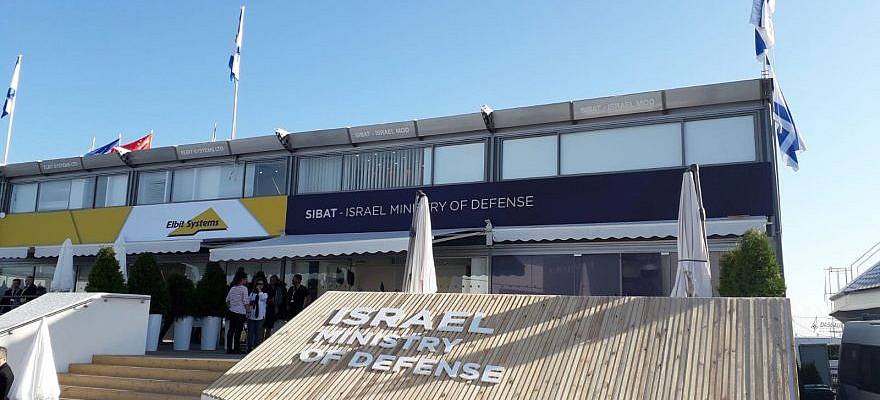Drones, anti-drone tech, missile systems and radars made in the Jewish state were on display at the International Paris Air Show.
By Yaakov Lappin, JNS
Israeli defense companies were out in full force at a key European defense exhibition in France in recent days, responding to a growing European willingness to spend on defense and homeland security.
Eight Israeli firms showcased defense technologies at the International Paris Air Show, held from June 17 to 23 at the Le Bourget exhibition center in Paris Airport.
Working with the Defense Ministry’s International Defense Cooperation Directorate (known by its Hebrew acronym, Sibat), the companies displayed advanced drones, anti-drone technology, missile systems, radars, bomb guidance kits with artificial intelligence features, and more.
“We see Europe as a very important destination for Israeli defense exports,” Paul Friedberg, deputy head of Sibat, told JNS. “Europe is facing challenges because of illegal migration that began a few years ago and waves of terrorism that did not previously exist. There has been a shakeup of personal security due to terrorism incidents,” he added, noting mass casualty attacks on targets such as stadiums, subways systems, and Jewish communities in Europe in recent years.
“This has changed thinking in Europe, and there is a need by European states to enter this sector,” he said. “We see a rise in the defense budgets in Europe.”
In addition, NATO states must allocate 2 percent of their GDP to military budgets – another factor ramping up European defense spending. “We see that NATO is moving in that direction,” said Friedberg.
In April, Israel’s Defense Ministry announced that defense sales to the international market surpassed $7.5 billion. When broken down by region, Europe formed the second largest export market for Israeli defense sales, at 26 percent.
“We view with importance the need to maintain good, stable relations with NATO and E.U. states. And we are pleased to share Israeli technology with these countries,” stated Friedberg. “We are happy to create technology connections between Israeli and European companies. This is a win-win for all sides.”
As a part of this cooperation, Israeli companies allow European partners to set up local production lines that use Israeli know-how to make defense products. Friedberg described that as a catalyst for both Israeli and European firms.
“If, in some states, there is [Israeli] drone activity, for example, that could see local production lines [being] set up for transferring some of the knowledge,” he explained.
An additional trend that Sibat has seen in Europe is a rise in the number of government-to-government tenders for defense sales. These types of transactions allow Israel to share more operational knowledge, said Friedberg.
Israeli counter-drone systems have attracted much attention in Paris, as well as cyber-defense solutions. Other areas of interest were border defense systems, a safe city program, and air defenses, as well as solutions for securing strategic facilities against a range of attacks.
Israel’s ability to contribute to European capabilities has served as an effective counter-action to BDS efforts in Western Europe. In light of the growing security challenges, European governments have seized on the opportunity to import Israeli technology and know-how, despite BDS efforts to harm such ties.
The exhibition included a number of Israel’s leading defense industries, such as Rafael, Elbit Systems, Israel Aerospace Industries (IAI), Aeronautics Defense Systems, and UVision. Bet Shemesh Engines and BIRD Aerosystems also participated.
Brig. Gen. Yair Kulas, the recently appointed director of Sibat, traveled to Paris to take part.
“The European Defense Market is among the most competitive and rapidly growing markets in the world,” he said. “The European continent is encountering various security challenges including domestic security, counter-terrorism, and border defense. The [show] is an opportunity for exporters and innovators to present their solutions, and this is particularly true for Israel, which is considered a global leader in defense technologies. The demand for advanced Israeli technologies has been on the rise in Europe in recent years, and we will work hard, together with the Israeli industries, to maintain and enforce this trend.”
In Paris, Elbit systems presented new products in the areas of precision-guided munition and commercial aviation protection. The company also displayed its Hermes 45 long-endurance unmanned aerial vehicle (UAV).
IAI unveiled its new Theron UAV, which provides real-time intelligence in an advanced manner, and a new radar system.
“IAI entered into approximately $1 billion worth of deals last year, in Europe alone,” Sibat said in a statement.
Rafael put on display a range of solutions for air battlespace dominance, including an air-to-ground bomb guidance kit, called Spice 250, which features new artificial-intelligence technologies to acquire targets.
